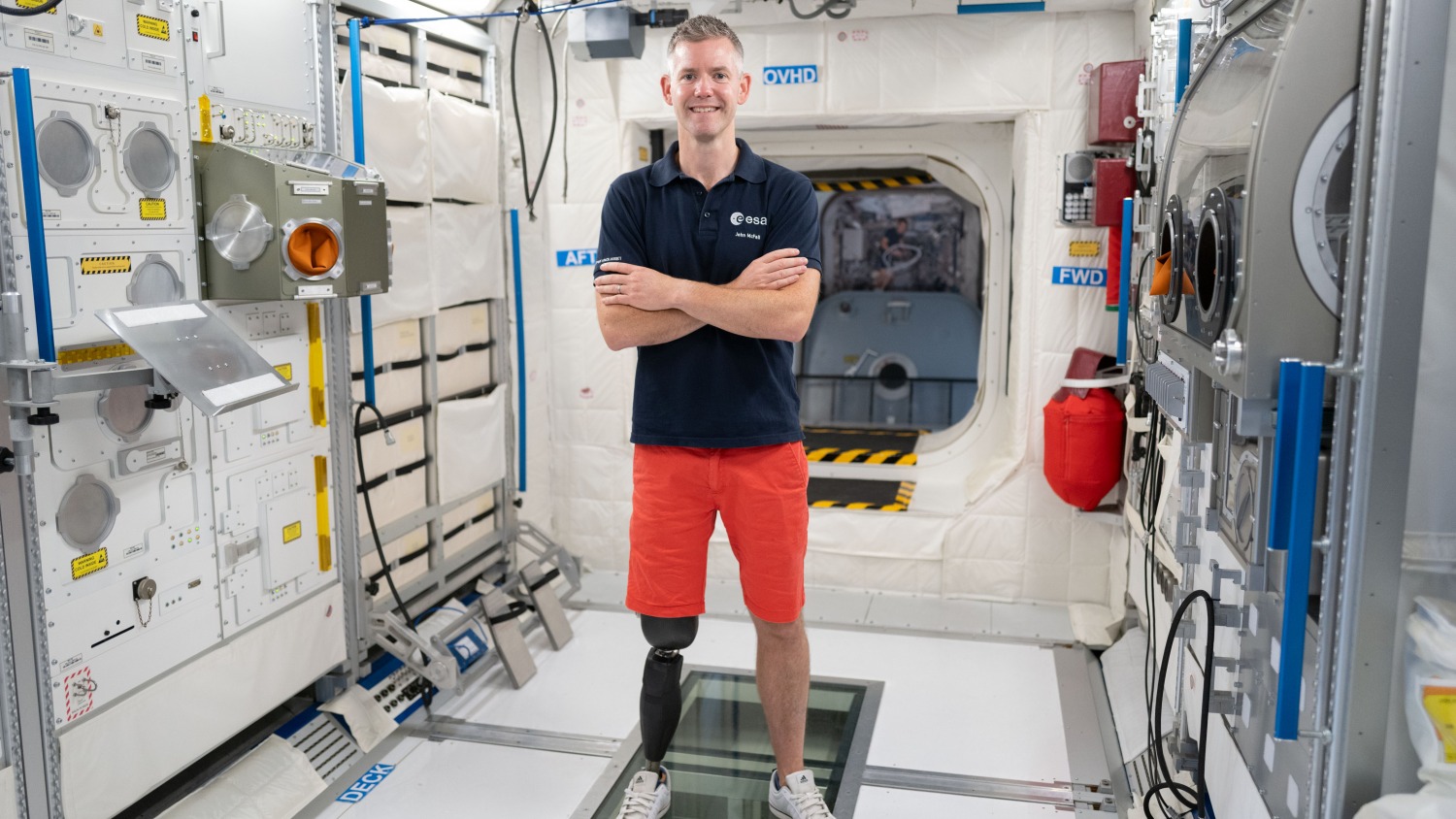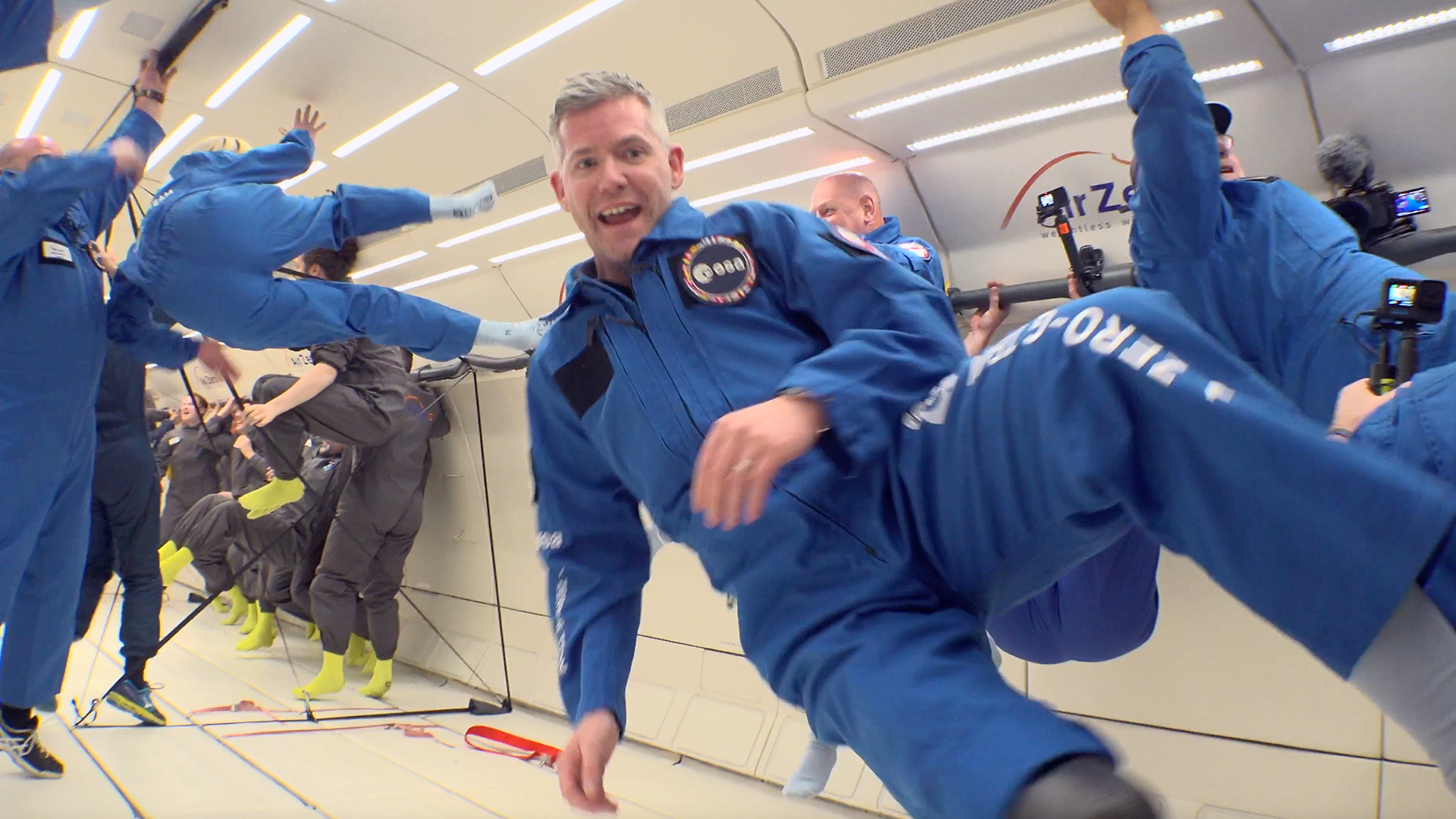Para-astronaut John McFall hopes to see an ISS astronaut with a disability fly by 2030 (exclusive, video)
"By the end of this decade, hopefully that would have happened."
John McFall is a para-astronaut, and he hopes the first person with disabilities will enter the International Space Station by 2030 — before the complex is slated to retire from service later that year.
A European Space Agency (ESA) reserve astronaut, McFall was selected for the program in 2022 based on his experience as a trauma and orthopedic specialist, surgeon and exercise scientist. McFall also has lived experience with a disability as he has used prosthetics regularly since the amputation of his right leg at age 19, following a motorcycle accident. (He even won a bronze medal in the 2008 Paralympics in the 100-meter sprint, class T42.)
A recent study dubbed "Fly!" — in which McFall played a key role — found there would be no major issues to International Space Station missions should an astronaut use a prosthesis on board. There is more work to be done, but the goal is for it all to culminate in flying "someone with a physical disability" to the ISS, McFall told Space.com in an exclusive interview on Aug. 8. "By the end of this decade, hopefully that would have happened."

Related: How spaceflight’s 'parastronaut program' could improve health-care practices here on Earth
ESA and NASA worked on Phase 1 of the "Fly!" study in 2022, before McFall was selected, to discuss the range of physical disabilities that may be accommodated on the ISS. They looked at case studies in literature from the military, for example, detailing how members with physical injuries returned to active service.
The agencies decided to conduct a feasibility study on lower limb disabilities, determining this to be an easier first step for inclusion than addressing vision, hearing or upper limbs, McFall said. This led to the call for para-astronauts that resulted in McFall's selection. Then, McFall and other team members moved forward on the feasibility study, which was discussed publicly last month. (The study is not available for release yet, but should be by spring 2025, McFall added.)
McFall is not a full-time astronaut, nor has he completed all required training. But he has done some familiarization work and is on standby should ESA have a short-term need for extra help in space. (One reserve astronaut from McFall's group, Marcus Wandt of Sweden, has gone to the station already. He flew on the weeks-long Axiom Space Ax-3 private mission to the ISS earlier this year.)
Get the Space.com Newsletter
Breaking space news, the latest updates on rocket launches, skywatching events and more!

The "Fly!" study looked at all requirements for astronaut activities from launch to landing, as well as tasks on the ISS that would require a prosthesis, such as exercise. McFall worked with SpaceX simulators and tried on spacesuits as part of the process, too.
"My background was incredibly useful," McFall said, explaining he uses at least three prostheses on Earth regularly: one for everyday activities, one for cycling and one for running. "Being an athlete and, obviously, being an amputee, I'm not really a very passive amputee. I'm quite involved in my care. I know how my prosthesis works. I'm a technology demonstrator."
#NewProfilePic pic.twitter.com/7TFAu8IIqqMay 23, 2024
McFall's medical background also includes a master's degree in biomechanics and gait analysis, which was beneficial in bringing together experts in engineering, medicine and other fields participating in the study. (Prostheses for future spaceflight, he said, would probably be a commercially available option for simplicity.)
"It's being an interlocutor, I think, and people asking questions that they understand in their world," McFall said. "They have their point of view: 'This is what happens in in my world. And I don't know what your world is like, John, but ... I wonder whether in my world, your situation could be a problem in this.' And I go, 'Okay, cool, let me understand your world a bit more.' And we have this conversation, and really kind of pick it apart."
Some questions the team considered, McFall said, included how the volume of his residual limb may change in spaceflight; happily, fluid shift showed no obvious differences in simulations. The prosthesis for spaceflight nevertheless will have a "volume adjustability" in case there is an unexpected increase in volume while in orbit, he said.
McFall also tested whether he could do CPR in microgravity without a prosthesis, as that is one of the basic requirements for ISS operations. Tests on a parabolic flight went perfectly, he said.
Future investigations could consider certifying a certain set of prosthetic hardware for spaceflight, McFall noted. But he said the work that the team has done so far is monumental: "It's not just been casual ... It's really been systematic, logical and very thorough — and I'm very, very proud of everyone around me who has delivered that."
"I'm just a subject matter expert," McFall continued. "Yes, I'm the one we're talking about [for a spaceflight], but there's a team here that have really worked hard to deliver this. There's a core group of people in this small team that we have. We've only got five of us in this team that have really had this vision of what we want to prove, to demonstrate to ESA: It's a groundbreaking, world-first study really pushing the boundaries of human space exploration."
Join our Space Forums to keep talking space on the latest missions, night sky and more! And if you have a news tip, correction or comment, let us know at: community@space.com.

Elizabeth Howell (she/her), Ph.D., was a staff writer in the spaceflight channel between 2022 and 2024 specializing in Canadian space news. She was contributing writer for Space.com for 10 years from 2012 to 2024. Elizabeth's reporting includes multiple exclusives with the White House, leading world coverage about a lost-and-found space tomato on the International Space Station, witnessing five human spaceflight launches on two continents, flying parabolic, working inside a spacesuit, and participating in a simulated Mars mission. Her latest book, "Why Am I Taller?" (ECW Press, 2022) is co-written with astronaut Dave Williams.









